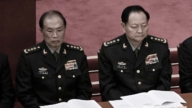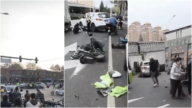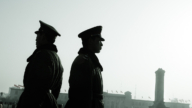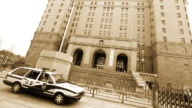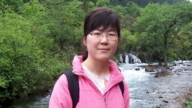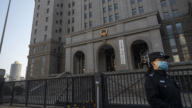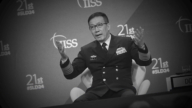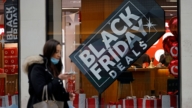【新唐人2013年03月26日訊】中共全國人大法律委員會主任喬曉陽日前表示,香港特首必須由「愛港愛國」的人士擔任,不能接受與中央政府對抗的人擔任行政長官。這番講話激起外界的一番論戰和批評。而且,喬曉陽提出的「三個堅定不移」,被視為是明確顯示了北京的底線。
據報導,喬曉陽是3月24號,在深圳與37名親中的香港建制派立法會議員舉行座談會時,表明瞭中共中央對香港特首普選的底線。
香港親北京政黨民建聯主席譚耀宗引述喬曉陽的話說,喬提出三個堅定不移,包括:2017年香港普選特首必定落實,絕無拖延﹔行政長官必須是「愛國愛港」人士,跟中央對抗的人必定不能勝任行政長官﹔以及,關於普選的安排按《基本法》及人大常委決定進行。
對於喬曉陽的「愛國愛港」論,香港各界立即作出回應。
香港作家、自由撰稿人張成覺:「他這個所謂愛國,就是愛北京,等於說愛中共,它這個國就是共產黨﹔愛港就是一個幌子,你說香港人不愛香港,也很難理解了,是吧?」
香港作家、自由撰稿人張成覺指出,中共的這套說辭是老調子了,主要原因就是它要控制2017年的普選。
張成覺:「它是老調重彈,主要因為2017年普選是一人一票,投票的人就比現在『小圈子選舉』的1600人要多了,所以它就要造這個輿論,等於向香港的民眾、香港的老百姓打招呼,你們一定要聽我們北京這個指揮棒,否則選出來我們也不承認。等於一種威脅。」
香港公民黨主席余若薇對喬曉陽的言論表示非常失望。香港工黨主席李卓人則對喬曉陽的說法表示非常不滿,他認為,喬曉陽的說法是向香港人宣戰。
香港熊立武術舞蹈團團長熊立:「他們是一定要愛共產黨,才算是『愛國愛港』,而我們不是這樣認為的,這個標準是完全不同的。共產黨就是把黨和國家的概念混為一談,它就是顛倒是非、混淆概念,在這裡渾水摸魚。這個問題不搞清楚,香港的很多問題都無法搞清楚。」
香港熊立武術舞蹈團團長熊立還指出,中共的所謂「愛國愛港」,是以維護共產黨的一黨專政為標準,與香港市民的核心價值互相衝突。
熊立:「我們的價值觀就是人權、自由、民主、法治。我們是愛國家,我們愛的是中華民族,愛的是人民,不一定要去愛共產黨。我們把這個東西分的非常清楚的。其實我們認為,要反黨,反黨才是愛國。只有反共產黨才是真正的愛國。」
張成覺也認為,這讓大家進一步看清中共面目。
張成覺:「不過他這麼一講,也就提前把2017年這個所謂普選的真面目給揭開了,並不是甚麼真普選。僅僅是一個遊戲,或者是共產黨控制下的把戲。共產黨做事情有時是這樣的,它就是『我是流氓我怕誰』這麼一種邏輯。」
大陸網民則紛紛在微博上留言。
一名網友(sistar陳惠敏)在微博上說,如果香港行政長官連愛國愛港的條件都不能符合,這個人又怎樣為香港市民謀福祉呢?
不過,署名微博路人丙的網友質疑,何謂愛港愛國?他留言寫道,那些貪官污吏屬不屬於愛國?那些為人民爭取民主卻被打入冤獄的人,算不算愛國?一句愛國愛港就窒礙香港應有的民主進程。
更有網友問道:「請問『愛國愛港證』在甚麼地方報考?」
香港基本法委員會委員、香港大學法律教授陳弘毅則在23號表示,「愛國愛港」是一個政治概念,不是法律概念。香港《基本法》條文中沒有訂明「愛國愛港」的要求。
採訪/朱智善 編輯/王子琦 後製/蕭宇
Beijing’s Demand for Patriotic Executive Triggers Debates in HK
China’s director of NPC Law Committee Qiao Xiaoyang,
recently commented how Hong Kong’s Chief Executive
must first be someone patriotic,
not anyone confronting the central government.
His remarks stirred up controversial discussions and criticism.
Qiao proposed “three resolutions" read as Beijing’s bottom line.
On Mar. 24 during talks with 37 pro-CCP members
from the Hong Kong Legislative Council,
Qiao laid out his bottom line as candidates for
Hong Kong’s Chief Executive.
Tam Yiu-chung, Chairman of Hong Kong pro-Beijing
Party DAB, quoted Qiao’s “three resolutions”:
1) Hong Kong’s Chief Executive by universal suffrage,
must be implemented by 2017 without delay;
2) Chief Executive must be “patriotic" without
confrontation with the central government;
3) Universal suffrage must abide by HK’s Basic Law
and decisions from the Standing Committee of the National People’s Congress.
Local communities in Hong Kong immediately
responded to Qiao’s talks on patriotism.
Hong Kong freelance writer Zhang Chengjue:
“This so-called ‘patriotic’ means love only for Beijing, love only for CCP.
His definition of patriotism equals Party-patriotism,
whereas love for Hong Kong only serves as a camouflage.
It makes no sense at all, why would Hong Kong people
not love their own country ?”
Hong Kong freelance writer Zhang Chengjue pointed out that,
CCP plays an old tune with such dictions.
Its main purpose is to control the universal suffrage in 2017.
Zhang Chengjue: “CCP is simply repeating its cliche.
In the 2017 universal suffrage, each person will have a vote,
different from the current small circle election by 1600 delegates.
Now they issue such public remarks to warm HK people that
they will have to follow the will of Beijing’s order.
Otherwise Beijing will not recognize a publicly
elected executive. This is nothing but a threat.”
Audrey EU, Chairman of Hong Kong’s Civic Party,
expressed deep disappointment at Qiao’s remarks.
Lee Cheuk-yan, Chairman of Hong Kong Labor Party, said he
takes Qiao’s statement as a declaration of war to HK people.
Xiong Li, leader of a Hong Kong Dance company:
“They [CCP] count the love for CCP as love for HK and China,
but we do not believe so. We have different standards.
CCP always confuses the concepts of party and state.
It deliberately muddles right and
wrong to take advantage of the confusion.
Without clarifying this issue, many problems in HK
will remain un-resolved.”
Xiong Li also pointed out that CCP’s so-called patriotism
is to maintain the one-party dictatorship, which conflicts the core values of Hong Kong people.
Xiong Li: “We believe in such values as human rights,
freedom, democracy, and the rule of law.
We do love the country. What we love is the Chinese nation
and Chinese people, not necessarily Chinese Communist Party.
We distinguish between them very clearly.
In fact, we believe that only anti-CPP is real patriotism.”
Zhang Chengjue also believes that Qiao’s remarks
further reveal CCP’s true nature.
Zhang Chengjue: “With these words, Qiao has uncovered the
truth of the so-called universal suffrage of 2017 in advance.
It will not be a genuine universal suffrage but only a game,
or otherwise a trick under CCP’s control.
CCP always follows such logic, “I am indeed a rogue.
What would I be afraid of when I am a rogue?”
Mainland Internet users widely posted on Weibo
about this issue.
A netizen Sistar Chen Huimin said, if the Chief Executive
of Hong Kong is not even patriotic of HK and China,
how can he seek the well-being of Hong Kong people at all?
Internet user Passer-by on Weibo,
questioned what patriotism really means.
He asked in his post, are those corrupt officials patriotic?
Are those political dissidents patriotic when they are jailed
for their fight for democracy and human rights?
The so-called patriotism indeed impedes
HK’s democratic progress.
Some users asked: “Where can we take exams for
this ‘Patriotic Certificate?”
Albert Chen, member of HK Basic Law Committee
and Hong Kong University professor of law,
said on Mar. 23rd that “patriotic" is a political concept,
not a legal concept.
HK Basic Law does not include terms on “patriotism."


